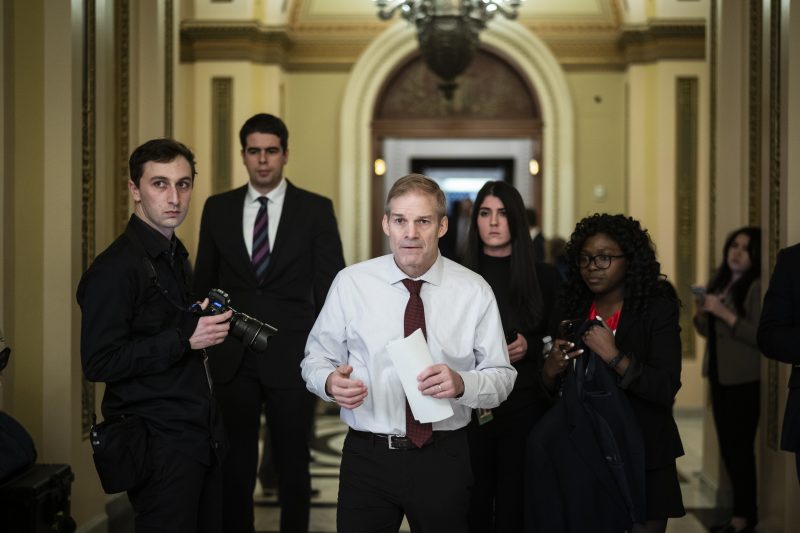The GOP-controlled House’s new Select Subcommittee on the Weaponization of the Federal Government is, as you might expect, predicated on the idea that the federal government has been weaponized — and specifically against conservatives.
But when it comes to the premise embedded in its name, the committee has a lot of convincing to do.
A new Washington Post-ABC News poll finds that Americans, by and large, don’t think the committee’s purpose is legitimate. Americans say, by a 56 percent to 36 percent margin, that the committee is “just an attempt to score political points,” according to the poll.
What’s more, just 28 percent believe that government agencies are indeed biased against conservatives. That’s more than the share that believes they’re biased against liberals (11 percent), but nearly two-thirds of Americans don’t believe conservatives are being singled out.
Another poll last week, from Fox News, appeared to show more support for the committee’s founding purpose. It found 43 percent said it was “very important” for Congress to investigate whether agencies like the FBI and IRS are biased against conservatives. And 7 in 10 said it was at least somewhat important.
But it’s also true that people tend to like the idea of investigating things, just in general. And isolating the IRS in the question probably increased support, given what happened a decade ago when an inspector general found the agency had improperly singled out tea party groups. (Very notably, it emerged years later that progressive groups were also singled out.)
When it comes to the many other issues Republicans have signaled the committee might focus on, though, it’s not so clear the American people even agree there’s something amiss.
The Russia investigation? A 2019 Fox News poll found Americans said 49-39 that special counsel Robert S. Mueller III’s probe was legitimate, rather than a “bogus attempt” to undermine Trump. (Other polls showed a similar split, and special counsel John Durham’s investigation in this vein didn’t turn up much.)
The allegedly overzealous targeting and harsh treatment of Jan. 6 defendants? There’s little evidence Americans agree that has taken place, and a late 2021 poll showed just 25 percent opposed continuing to identify and arrest them.
Social media companies targeting conservatives? A December Fox News poll found 39 percent of Americans thought these companies were biased against the right, but 6 in 10 did not.
(Fox News has tended to be the pollster asking about these issues, given that they’re often a focus of its programming.)
The FBI’s search of Mar-a-Lago last summer? A September Fox News poll found Americans thought it was “appropriate,” by a 56-39 margin. A Wall Street Journal poll found 52 percent agreed it was “part of a legal and proper investigation,” while 41 percent thought it was part of the Biden administration’s “witch hunt” and “harassment” of Trump.
As for the FBI supposedly targeting the Trump administration more broadly? A 2018 Marist College poll found Americans said by a 2-to-1 margin that it was just doing its job, rather than that it was biased against the administration. And a Quinnipiac University poll from that same year found Americans said 53-34 that the FBI was not biased against Trump, as Trump claimed.
The FBI is among the earliest topics the committee is focusing on with its letters to potential witnesses. Another apparent focus is the Justice Department’s purported targeting of school-board protesters. Republicans have suggested that the department was going after them merely for expressing opposition to school curriculum, when in fact it said it would investigate physical threats.
And when the National School Boards Association requested that DOJ help? A Fox poll in October 2021 showed 53 percent felt the school boards “truly need extra protection from real threats,” while 40 percent of Americans agreed with the argument it was an attempt “to stop parents from opposing their policies.”
(Another focal point of the committee’s early letters is the Department of Homeland Security’s Disinformation Governance Board. But because that initiative was quickly shelved, we didn’t get any good polling about Americans’ views of it — or, for that matter, any real sense for how it might one day be “weaponized.”)
The numbers across nearly all of these polls are remarkably similar: Around 4 in 10 Americans do see “witch hunts” and conservatives being targeted, but usually a majority disagrees. Some of that is partisanship, but such surveys suggest that even the right-leaning half of the country isn’t completely sold on the idea that the federal government has been “weaponized” against conservatives.
So it’s perhaps no surprise that just 36 percent see the new committee as legitimate. But just as notably, at this point, it looks like the committee is viewed as significantly less legitimate than some of the investigations it will probe.
Barring some major discoveries to draw broader public attention, the committee will apparently be singing to the choir.



























